

Want Real Choice in Broadband? Make These 3 Things Happen. Regulators are now off the backs of big internet providers.
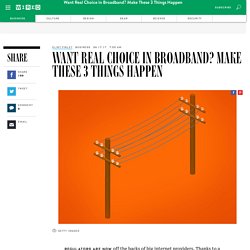
Thanks to a resolution signed by President Trump earlier this month, consumer-friendly privacy rules passed by the Obama-era Federal Communications Commission won’t take effect. Rules designed to protect net neutrality—the idea that internet providers shouldn’t be able to give certain content preferential treatment—seem likely to fall next. Republicans argue that the government should stay out of regulating the internet. The impact of Internet in rural India. Internet has greatly influenced the way individuals socialize, create and exploit economic opportunities and knowledge resources.
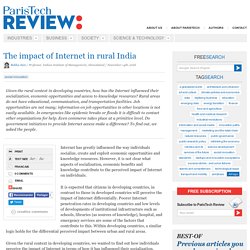
However, it is not clear what aspects of socialization, economic benefits and knowledge contribute to the perceived impact of Internet on individuals. It is expected that citizens in developing countries, in contrast to those in developed countries will perceive the impact of Internet differentially. Poorer Internet penetration rates in developing countries and low levels of developments of institutional infrastructure such as schools, libraries (as sources of knowledge), hospital, and emergency services are some of the factors that contribute to this.
Within developing countries, a similar logic holds for the differential perceived impact between urban and rural areas. How the ‘Net works: an introduction to peering and transit. In 2005, AT&T CEO Ed Whitacre famously told BusinessWeek, "What they [Google, Vonage, and others] would like to do is to use my pipes free.
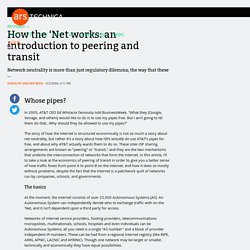
But I ain't going to let them do that…Why should they be allowed to use my pipes? " The story of how the Internet is structured economically is not so much a story about net neutrality, but rather it's a story about how ISPs actually do use AT&T's pipes for free, and about why AT&T actually wants them to do so. These inter-ISP sharing arrangements are known as "peering" or "transit," and they are the two mechanisms that underlie the interconnection of networks that form the Internet. In this article, I'll to take a look at the economics of peering of transit in order to give you a better sense of how traffic flows from point A to point B on the Internet, and how it does so mostly without problems, despite the fact that the Internet is a patchwork quilt of networks run by companies, schools, and governments.
The basics. What Is Internet Governance? (and why should we care?) Digital Attack Map. The Internet Lives in a Huge Hotel in Manhattan. There is no shortage of cool stuff to see on the Internet, but the Internet itself—the networks and servers and cables tying it all together—is pretty mundane.
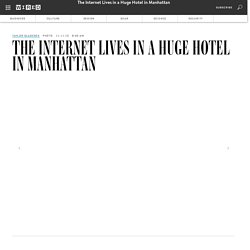
Peter Garritano discovered as much when he went behind the scenes at some of New York’s big Internet hubs to see how it all works. Garritano always knew the Internet is as much a place as it is a thing, one where vast networks in frigid rooms move enormous amounts of data around the world. But he didn’t have a real understanding of how all that info moves from one place to another, and he wanted to find out. Internet Issues, Technology, Standards, Policy, Leadership. Internet Issues, Technology, Standards, Policy, Leadership. Quand France Telecom voulait interdire Internet... Quand l’État vous disait qu’Internet n’avait aucun avenir. Mon attention a été attirée sur le rapport Thery de 1994.

Intitulé « Les autoroutes de l’information », il fut écrit par Gérard Théry, Alain Bonnafé, Michel Guieysse et adressé au Premier ministre de l’époque, Édouard Balladur. La lecture de ce rapport, presque 20 ans après, est fort instructive Elle révèle comment trois technocrates français parmi les plus compétents (Théry est polytechnicien et ingénieur des télécoms) voyaient l’avenir des autoroutes de l’information et le rôle que l’internet allait y jouer. En substance, l’existence de ce dernier est reconnue, mais il est rapidement écarté. On lit en effet : « Son mode de fonctionnement coopératif n’est pas conçu pour offrir des services commerciaux. Sans rire. La question qu’il faut se poser est donc celle de savoir pourquoi des gens intelligents commettent de pareilles bévues. Mais dans ce cas, il eût mieux valu se taire. 1ère erreur : l’extrapolation Ne riez pas : les prédicateurs font cela tous les jours. —Sur le web. 40 maps that explain the internet.
The internet increasingly pervades our lives, delivering information to us no matter where we are.
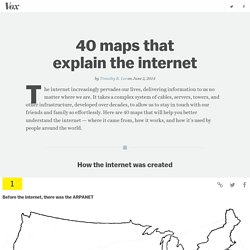
Transmission Control Protocol. Web browsers use TCP when they connect to servers on the World Wide Web, and it is used to deliver email and transfer files from one location to another.
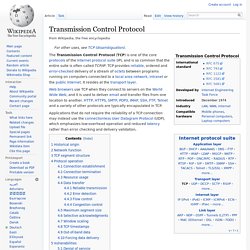
HTTP, HTTPS, SMTP, POP3, IMAP, SSH, FTP, Telnet and a variety of other protocols are typically encapsulated in TCP. Historical origin[edit] In May 1974 the Institute of Electrical and Electronic Engineers (IEEE) published a paper titled "A Protocol for Packet Network Intercommunication. "[1] The paper's authors, Vint Cerf and Bob Kahn, described an internetworking protocol for sharing resources using packet-switching among the nodes. Network function[edit] The protocol corresponds to the transport layer of TCP/IP suite. Internet Protocol. This article is about the IP network protocol only.
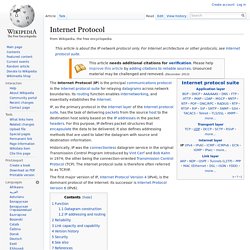
For Internet architecture or other protocols, see Internet protocol suite. Mises Institute. Libertarians often cite the internet as a case in point that liberty is the mother of innovation.
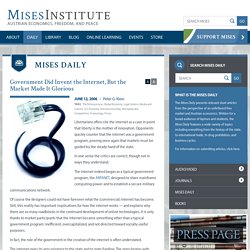
Opponents quickly counter that the internet was a government program, proving once again that markets must be guided by the steady hand of the state. In one sense the critics are correct, though not in ways they understand. The internet indeed began as a typical government program, the ARPANET, designed to share mainframe computing power and to establish a secure military communications network. Of course the designers could not have foreseen what the (commercial) internet has become. Still, this reality has important implications for how the internet works — and explains why there are so many roadblocks in the continued development of online technologies. In fact, the role of the government in the creation of the internet is often understated. The internet owes its very existence to the state and to state funding. In no sense can we say that packet-switching is the "right" technology. Did Al Gore Claim He Invented the Internet? Claim: Vice-President Al Gore claimed during a news interview that he "invented" the Internet.
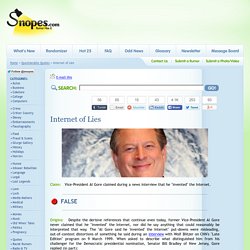
Origins: Despite the derisive references that continue even today, former Vice-President Al Gore never claimed that he "invented" the Internet, nor did he say anything that could reasonably be interpreted that way. The "Al Gore said he 'invented' the Internet" put-downs were misleading, out-of-context distortions of something he said during an interview with Wolf Blitzer on CNN's "Late Edition" program on 1999.
How Government Did (and Didn't) Invent the Internet. Last night, I happened across an article by Slate technology scribe Farhad Manjoo. He was responding to an opinion piece in the Wall Street Journal by the Journal’s former publisher Gordon Crovitz. And when Manjoo explained just what Crovitz was opining about, I felt my jaw drop to the floor as if I were a character in a 1940s cartoon. Fibre optique : l'Arcep veut accélérer le déploiement grâce une astuce. Qui a vraiment créé Internet ? How the Internet Works in 5 Minutes. Microsoft Grabs No-IP Websites. Neutralité : le CSA milite pour utilisation préférentielle de la bande passante. Le CSA, pour pousser les acteurs de type Netflix à investir en France, compte agiter une carotte de taille : avantager ceux qui se plieront à ses règles.
Parmi les avantages, une bande passante plus importante sera notamment proposée. Une mise à mal de la neutralité du Net dont est bien conscient Olivier Schrameck, le président du Conseil Supérieur de l'Audiovisuel. Olivier Schrameck « Mais encore faut-il que le conventionnement soit suffisamment attractif » Comment l’État a participé à la création de l’internet. Par Steve Fritzinger, depuis les États-Unis.